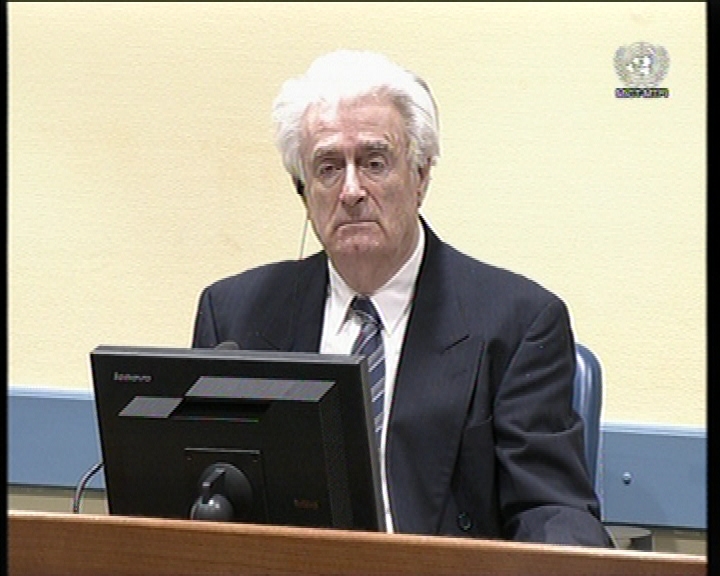Home
RADOVAN KARADZIC’S ‘CATALOGUE OF GENERAL COMPLAINTS’
At an extraordinary status conference, Radovan Karadzic told the judges he was ‘astonished’ when he received the 40-year prison sentence, as he had already packed his bags to go home. The accused complained about the conditions in the Detention Unit, demanding an inquiry into the rash of malignant diseases among the inmates. Since his health has been steadily ‘deteriorating’ over the years, Karadzic wants the judges to set him free pending the appellate judgment
 Radovan Karadžić - Status conference
Radovan Karadžić - Status conference ‘I can’t believe where I am and what is happening to me’, said Radovan Karadzic today in his first court appearance following his trial judgment two weeks ago. The Trial Chamber sentenced Karadzic to 40 years in prison for genocide and other crimes in Bosnia and Herzegovina. He had already packed his bags, so certain he was that he would be acquitted. The accused was ‘astonished’ when he heard the judgment, given the assurances he had received from Holbrooke that he would not be put on trial. Furthermore, Karadzic’s participation in the proceedings over the past eight years has been ‘exemplary’, and Karadzic has not in any way brought the Tribunal into disrepute, although the Tribunal is in his view an institution that will ‘surely one day crumble into dust of insignificance’.
The status conference today was scheduled to allow Karadzic to tell the judges about his health problems and about the conditions in the Detention Unit. The president of the International Mechanism for International Criminal Tribunals Theodor Meron nevertheless decided to let Karadzic present a ‘catalogue of general complaints’, as he put it. Karadzic complained that he was in perfect health when he arrived in the Detention Unit, but his health, has been ‘deteriorating’ steadily due to work pace, ‘inequality of arms’, ‘unfair trial’, ‘bad food’, the fact that he has been denied the needs that all ‘educated and cultured people’ have, and has been given ‘outdated technology from the last century’ to use in the Detention Unit. In fact, the Detention Unit reminded him of a ‘communist or Turkish prison’.
According to Karadzic, in the eight years he has been in the Tribunal’s Detention Unit ‘many persons’ got cancer and died quickly. ‘No one has investigated’ those deaths, Karadzic claimed. The detainees, referred to by Karadzic as ‘the elite of the Serb nation’, were denied access to the ‘benefits Europe has to offer’. Holland enjoys plenty of those benefits and yet it has failed to give the detainees access to them. To ‘reduce the damage’ caused to date and ‘in the three years that will pass until the appellate judgment is rendered’, Karadzic wants to be granted provisional release and would ‘continue cooperating with judicial institutions’.
Judge Meron addressed the only specific complaint Karadzic had made: the allegedly increased incidence of malignancies in the Detention Unit. Judge Meron assured Karadzic that he had taken the allegation seriously, indicating that he would ask the Registry to investigate it. Commenting on Karadzic’s complaints about the conditions in the Detention Unit, Judge Meron invoked the evaluations of the UN Detention Unit made by a number of experts who have always given it ‘very high’ grades. In fact, Meron noted, the Tribunal’s Detention Unit is considered as the ‘golden standard’; ‘many would be glad to have such conditions in detention’. As far as his request for provisional release was concerned, Judge Meron advised Karadzic that he and his lawyer Peter Robinson should file a motion for provisional release. Interestingly, after the trial verdict, Robinson was promoted from legal adviser to defense counsel.
Robinson said that after the sentencing Karadzic was like a ‘caged tiger’. Since Judge Meron didn’t allow any further discussion on issues that pertain to the appellate proceedings, Robinson merely complained that Karadzic had been given a ‘very old and slow’ computer. Karadzic wants to be allowed to use a laptop of his own and to have restricted internet access because he wants to follow the latest developments in science and culture.
Linked Reports
- Case : Karadzic
- 2016-04-05 STATUS CONFERENCE ON KARADZIC’S MENTAL AND PHYSICAL HEALTH
- 2016-03-24 RADOVAN KARADZIC SENTENCED TO 40 YEARS IN PRISON
- 2016-03-20 KARADZIC'S „JUDGMENT DAY“
- 2016-04-22 KARADZIC ASKS FOR PROVISIONAL RELEASE
- 2016-05-02 JUDGE MERON’S LETTER TO KARADZIC
- 2016-05-03 PROSECUTION AGAINST PROVISIONAL RELEASE FOR KARADZIC
